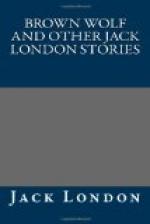“When day came, there being nothing of the schooner, I turned my face to the land and journeyed into it that I might get food and look upon the faces of the people. And when I came to a house I was taken in and given to eat, for I had learned their speech, and the white men are ever kindly. And it was a house bigger than all the houses built by us and our fathers before us.”
“It was a mighty house,” Koogah said, masking his unbelief with wonder.
“And many trees went into the making of such a house,” Opee-Kwan added, taking the cue.
“That is nothing.” Nam-Bok shrugged his shoulders in belittling fashion. “As our houses are to that house, so that house was to the houses I was yet to see.”
“And they are not big men?”
“Nay; mere men like you and me,” Nam-Bok answered. “I had cut a stick that I might walk in comfort, and remembering that I was to bring report to you, my brothers, I cut a notch in the stick for each person who lived in that house. And I stayed there many days, and worked, for which they gave me money—a thing of which you know nothing, but which is very good.
“And one day I departed from that place to go farther into the land. And as I walked I met many people, and I cut smaller notches in the stick, that there might be room for all. Then I came upon a strange thing. On the ground before me was a bar of iron, as big in thickness as my arm, and a long step away was another bar of iron——”
“Then wert thou a rich man,” Opee-Kwan asserted; “for iron be worth more than anything else in the world. It would have made many knives.”
“Nay, it was not mine.”
“It was a find, and a find be lawful.”
“Not so; the white men had placed it there. And further, these bars were so long that no man could carry them away—so long that as far as I could see there was no end to them.”
“Nam-Bok, that is very much iron,” Opee-Kwan cautioned.
“Ay, it was hard to believe with my own eyes upon it; but I could not gainsay my eyes. And as I looked I heard ...” He turned abruptly upon the head man. “Opee-Kwan, thou hast heard the sea-lion bellow in his anger. Make it plain in thy mind of as many sea-lions as there be waves to the sea, and make it plain that all these sea-lions be made into one sea-lion, and as that one sea-lion would bellow so bellowed the thing I heard.”
The fisherfolk cried aloud in astonishment, and Opee-Kwan’s jaw lowered and remained lowered.
“And in the distance I saw a monster like unto a thousand whales. It was one-eyed, and vomited smoke, and it snorted with exceeding loudness. I was afraid and ran with shaking legs along the path between the bars. But it came with speed of the wind, this monster, and I leaped the iron bars with its breath hot on my face ...”
Opee-Kwan gained control of his jaw again. “And—and then, O Nam-Bok?”




